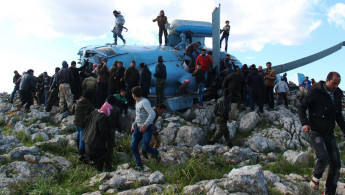The Free Men of Syria and their national ambitions
This union has put the Islamic Front alliance, another rebel group in the area, in an awkward position, and might prove to be a worthy adversery to al-Nusra Front and block their expansionist ambitions in Idlib.
New front
Opposition forces and the regime's army are preparing to lock horns in Idlib. The new rebel outfit, meanwhile, is looking to drive regime forces completely out of the province.
The Idlib offensive was announced online following a meeting between the military chiefs of the new rebel coalition.
The Free Men's objectives are not new, at least not on a military level.
The deputy commander of one of the factions that joined the union, Ali al-Omar Abu Ammar, said the goals behind the merger was to close ranks among the opposition and create a strong nucleus against Syria's President Bashar al-Assad.
It also wants to take on the regime's foreign militias, unify judicial bodies and courts in its territory, and oversee the running of the Bab al-Hawa border crossing.
There has rarely been a military operation in the Idlib countryside that has not included joint action between the two groups that now make up the Free Men.
Coordination between the factions has always been close, and so the merger in reality is largely ceremonial.
Nevertheless, the move reflects the aims of the larger group in the alliance, the Free Men of the Levant, and the merger will benefit them the most.
First, the movement will gain more territory in Idlib, giving it a greater military momentum.
Second, its popular base will expand, especially since Abu Issa al-Sheikh, the leader of the Hawks of the Levant Brigades - one of the groups comprising the new alliance - is popular among the people of Jabal al-Zawiya and some regions of the Idlib countryside.
Third, new channels of support for the movement are beginning to open up. Both groups have different backers and sources of funding, despite being ideologically similar in their propagation of Salafism.
The Hawks of the Levant Brigades, which is ultimately the smaller party, has now merged with a major group that has a broader and more coherent plan in the campaign against the regime.
The Free Men of the Levant suffered a major blow with the assassination of its top leaders, which could have wiped out any other armed rebel group.
Yet the Free Men of the Levant absorbed the shock and regrouped, and now has attracted the Hawks of the Levant and perhaps other factions in the future.
A political adviser in the Islamic Front, who declined to be named, told al-Araby al-Jadeed that several developments made the merger inevitable.
Hawks of the Levant are a small militia in comparison to its partner, with no more than 500 fighters after 200 defected to the Nusra Front, al-Qaeda's Syrian franchise, several months ago. The men who remained were in favour of merging with the Free Men of the Levant.
But in effect, the declaration, though it has united the batallions on the one hand, it has written the obituary of the Islamic Front - a previous alliance of which the Free Men of the Levant were a part.
| The Free Men might rebrand itself as a more respectable, national Syrian movement. |
Only the Army of Islam survives in the Islamic Front, practically speaking.
Perhaps the initial mergers inside the Islamic Front had been temporary and in reaction to myriad military circumstances. By contrast, the Free Men of the Levant are seeking unions with smaller rebel groups as part of a long-term vision for the war.
The Free Men of the Levant had already attracted the Kurdish Islamic Front and Liwaa al-Haq (The Battalion of Righteousness) - two small former parties in the Islamic Front.
Nationalist movement
The new merger places the Islamic Front in a difficult position. The group had sought to unify as many military factions as was possible, and achieve broad support on the ground.
The Free Men are now also seeking new alliances and mergers.
This means that the Free Men of the Levant and al-Nusra are now the two main military forces in Idlib province.
However, this raises questions about the future relationship between these two groups, particularly as the al-Qaeda affiliate sees Idlib as key to its overall strategy.
Al-Nusra has initially welcomed the merger, judging by the positive tweets from its supporters, but the Free Men could become an obstacle to its long-term ambitions.
For one, it will open the door to new factions joining the Free Men, especially in light of its adoption of a new powerful secular slogan – "a people's revolution" - a departure from the more Islamist-tinged watchwords of the Islamic Front.
The new slogan supports recent leaks from the movement's ranks regarding the possibility that it might rebrand itself as a more "respectable", national Syrian movement and disassociate itself from extremist elements among the rebels.
If true, this would be reassuring for international parties and may attract backing, or promises, paving the way for Idlib's Free Men to take charge of Syria's destiny.
This article is an edited translation from our Arabic edition.



